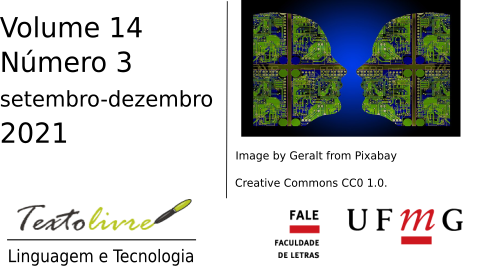“I see they are engaged”
mediation, interaction and investment in the development of reading comprehension in English in the emergency remote teaching mode
DOI:
https://doi.org/10.35699/1983-3652.2021.32572Keywords:
Additional language reading, Emergency remote teaching, Mediation, Interaction, InvestmentAbstract
The results brought in the article are part of a study in which data was generated based on a narrative drawn from an interview with a language teacher, here called CINTIA. The objective of the interview was to find out how she promoted the development of reading in English in a junior high school in the private sector in the Emergency remote teaching mode, since, due to the COVID-19 pandeic, students did not have face-to-face classes. The analysis intended to reflect over the following aspects: 1) How could mediation tools (SWAIN; KINNEAR; STEINMAN, 2015) promote English reading development in remote teaching mode? 2) How can interaction \cite{ellis2020, figueiredo2019} be developed in reading English classes of a junior high school in an emergency remote teaching and 3) In which aspects is it possible to perceive a Junior high learner’s investment (ELLIS, 2020; FIGUEIREDO, 2019) while developing his reading in English in the teaching remote mode? For this study, a semi-structured interview was carried out with an English teacher from a junior high school of the private sector in Porto Alegre, Rio Grande do Sul. CINTIA’s narrative suggests to show that the investment employed in this group of students seem to be related to physical tools (computer, internet, online dictionary), as well as symbolic ones (second and mother language) of mediation used by the teacher and her learners in interactional spaces done totally in the virtual mode.
Downloads
References
BOURDIEU, Pierre. What makes a social class? On the theoretical and practical existence of groups. Berkeley Journal of Sociology, v. 32, p. 1–17, 1987.
DARVIN, Ron; NORTON, Bonny. Investment and Language Learning in the 21st Century. Langage et société, v. 157, n. 3, p. 19, 2016. DOI: 10.3917/ls.157.0019. Disponível em: http://www.cairn.info/revue-langage-et-societe-2016-3-page-19.htm. Acesso em: 13 set. 2021.
ELLIS, Rod. A short history of SLA: Where have we come from and where are we going? Language Teaching, v. 54, n. 2, p. 190–205, 2020. DOI: 10.1017/S0261444820000038. Disponível em: https://www.cambridge.org/core/product/identifier/S0261444820000038/type/journal_article. Acesso em: 13 set. 2021.
FETT, Ana Maria Munhoz; NÉBIAS, Cleide Marly. As mediações tecnológicas no desenvolvimento das funções psicológicas superiores. ETD - Educação Temática Digital, v. 7, n. 1, p. 103–132, 2005. DOI: 10.20396/etd.v7i1.599. Disponível em: http://periodicos.sbu.unicamp.br/ojs/index.php/etd/article/view/599. Acesso em: 13 set. 2021.
Figueiredo, Francisco José Quaresma de. Vygotsky: a interação no ensino/aprendizagem de línguas. 1ª ed. São Paulo: Parábola, 2019.
LANTOLF, James P.; THORNE, Steven L. Sociocultural theory and the genesis of second language development. Oxford: Oxford University Press, 2009.
LÉVY, Pierre. A web de ontem, a web de amanhã. [S.l.: s.n.], 2016. Disponível em: https://www.fronteiras.com/artigos/a-web-de-ontem-a-web-de-amanha. Acesso em: 2 nov. 2018.
NORTON, Bonny. Identity and language learning: extending the conversation. Second Edition. Bristol: Multilingual Matters, 2013.
SCHLATTER, Margarete; GARCEZ, Pedro de Moraes. Língua adicionais na escola: aprendizagens colaborativas em inglês. Erechim: Edelbra, 2012.
SWAIN, Merrill; KINNEAR, Penny; STEINMAN, Linda. Sociocultural theory in second language education: an introduction through narratives. Bristol: Multilingual Matters, 2015. (MM Textbooks).
VYGOTSKY, Lev. Mind in society: the development of higher psychological processes. Cambridge: Harvard University Press, 1978.
WENGER, Étienne. Communities of practice: learning, meaning, and identity. Cambridge: Cambridge University Press, 1998.
Downloads
Published
Issue
Section
License
Copyright (c) 2021 Texto Livre: Linguagem e Tecnologia

This work is licensed under a Creative Commons Attribution 4.0 International License.
This is an open access article that allows unrestricted use, distribution and reproduction in any medium as long as the original article is properly cited.











